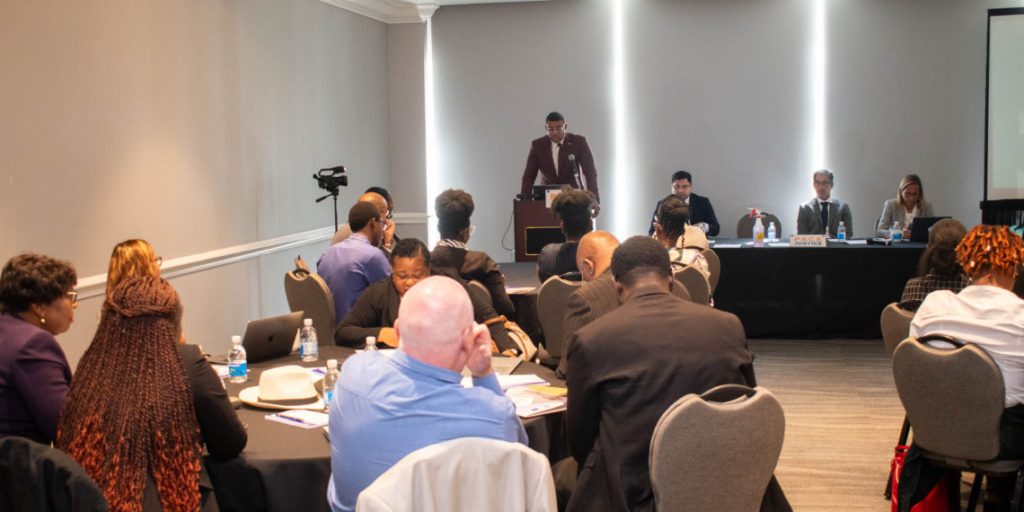Enhanced Case Management Training Bolsters Efficiency at the Ministry of Justice
The Attorney General’s Office and Ministry of Justice and Legal Affairs of St. Kitts and Nevis, in partnership with the UNDP PACE Justice Project and with funding from the European Union, conducted a two-day Case Management Training program on September 22nd and 23rd. This training brought together key stakeholders in the justice system, including judges, magistrates, prosecutors, defense attorneys, registrars, and court clerks. The primary objective was to equip these individuals with practical skills to enhance case management efficiency, minimize delays, and foster greater accountability within the justice system. The training reflects a commitment to modernizing and strengthening the judicial process in St. Kitts and Nevis.
Attorney General and Minister of Justice and Legal Affairs, the Hon. Garth Wilkin, delivered the opening remarks, stressing the detrimental impact of backlogs and delays on both the efficiency and public trust in the justice system. He highlighted how adjournments and protracted trials can impede the timely delivery of justice for victims, witnesses, and defendants alike. The training was positioned as a crucial step toward implementing practical measures to address these challenges, improve court efficiency, and ensure swifter resolution of cases. The Attorney General underscored the importance of this initiative in upholding the principles of fair and efficient justice.
The comprehensive training program covered a range of critical topics. Participants delved into effective case management techniques and explored the role of judicial controls in reducing delays. The training also emphasized the importance of judicial sanctions and accountability for legal counsel as mechanisms to promote a more efficient courtroom culture. Practical, scenario-based exercises allowed participants to apply their learning in real-world contexts, focusing on strategies for narrowing issues, agreeing on facts, and enforcing preparation. The curriculum further explored the importance of judicial leadership in transitioning from a reactive to a proactive approach to case flow management. Finally, recognizing the demanding nature of legal work, the training incorporated sessions on time and stress management to enhance professional well-being and effectiveness.
The training was facilitated by a distinguished panel of experts, including Justice of Appeal Mr. Boodoosingh, Justice Morley, Justice Thompson, Dr. Affonso, and Mr. García Muñoz. These facilitators brought a wealth of global, regional, and practical experience to the program, offering valuable insights and guidance to the participants. Their expertise enriched the training and provided participants with a broader perspective on best practices in case management.
This Case Management Training initiative aligns with the commitments outlined in the Needham Point Declaration on Criminal Justice Reform. This declaration identifies case management and plea negotiations as pivotal elements in modernizing criminal justice systems throughout the Caribbean region. By engaging in this training, St. Kitts and Nevis demonstrates its commitment to regional collaboration and its dedication to implementing best practices in criminal justice administration.
The Attorney General reiterated the government’s unwavering support for justice system reforms. He emphasized that successful case management requires a collaborative effort involving the judiciary, prosecution, defense, and court administration. He stressed the importance of professional responsibility in ensuring that justice is delivered in a timely, fair, and effective manner. This commitment underscores the government’s dedication to strengthening the rule of law and promoting public trust in the justice system. This initiative is not an isolated effort but part of a comprehensive justice reform agenda for the Federation, supported by the UNDP and the European Union.
This broader reform agenda encompasses various initiatives, including the digitization of court processes to streamline operations and enhance accessibility. It also includes diversion and rehabilitation programs, aimed at addressing the root causes of crime and reducing recidivism. Furthermore, the agenda incorporates wider institutional strengthening measures to enhance the capacity and effectiveness of the justice system as a whole. All these efforts are strategically aligned towards a central goal: reducing backlog and ensuring timely access to justice for all citizens of St. Kitts and Nevis. This holistic approach signifies a commitment to addressing systemic challenges and promoting a more just and equitable society.
The collaboration between the government, the UNDP, and the European Union demonstrates a shared commitment to strengthening the rule of law in St. Kitts and Nevis. The comprehensive nature of the reform agenda, encompassing technological advancements, alternative justice mechanisms, and institutional capacity building, reflects a long-term vision for a more efficient, accessible, and equitable justice system. By investing in these reforms, St. Kitts and Nevis is taking concrete steps to uphold the fundamental rights of its citizens and foster a society governed by the principles of justice and fairness. The focus on reducing backlogs and ensuring timely access to justice underscores the importance of efficiency and effectiveness in the judicial process, ultimately contributing to greater public trust and confidence in the administration of justice.
The training program and the broader reform agenda are vital investments in the future of St. Kitts and Nevis. By empowering justice system actors with the skills and resources they need, the government aims to create a more responsive and efficient judicial system. This, in turn, will contribute to a more stable and just society, where the rights of all citizens are protected and upheld. The ongoing collaboration with international partners demonstrates a commitment to learning from best practices and implementing innovative solutions to address the challenges facing the justice system. Ultimately, these efforts are aimed at strengthening the foundations of democracy and promoting the rule of law in St. Kitts and Nevis.
Share this content:












Post Comment